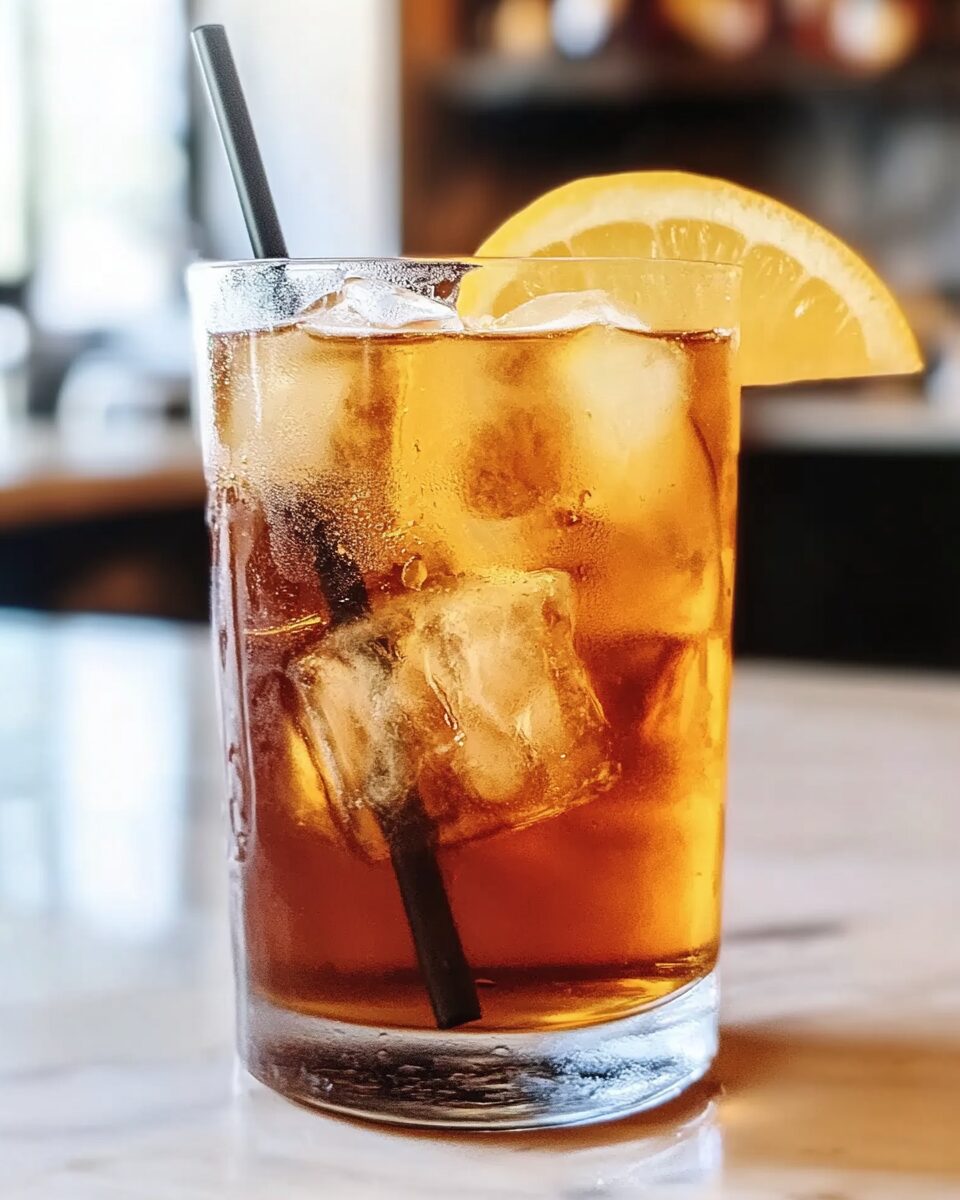Sweet Tea is a quintessential Southern beverage known for its refreshing and sweet flavor. This simple yet delightful drink combines black tea with sugar, served chilled over ice, making it a perfect companion for warm days.
Full Recipe:
Ingredients
-
1 family-size iced tea bag
-
4 cups filtered water
-
1/4 cup sugar
-
Ice
-
Optional: lemon slices for garnish
Directions
-
Prepare the Tea Concentrate:
-
Heat 2 cups of filtered water until it reaches a simmer (approximately 180°F or 82°C).
-
Pour the hot water into a heat-resistant pitcher and add the family-size iced tea bag.
-
Allow the tea to steep for 3-5 minutes, then remove and discard the tea bag.
-
-
Sweeten the Tea:
-
While the tea is still warm, add 1/4 cup of sugar.
-
Stir until the sugar is completely dissolved.
-
-
Dilute and Chill:
-
Add 2 cups of cold filtered water to the sweetened tea concentrate.
-
Refrigerate the tea for at least 30 minutes, or until thoroughly chilled.
-
-
Serve:
-
Fill glasses with ice and pour the chilled sweet tea over the ice.
-
Optionally, garnish with lemon slices for added flavor.
-
Nutritional Facts
Per 8-ounce (240 ml) serving:
-
Calories: 25 kcal
-
Carbohydrates: 7g
-
Sugars: 6g
-
-
Sodium: 12mg
-
Calcium: 7mg
History of Sweet Tea
The origins of sweet tea are often debated, but it is generally agreed that it has roots in the Southern United States. Sweet tea became a staple of Southern cuisine and culture in the 19th century. Although tea was introduced to America during the colonial period, it wasn’t until the early 1800s that sweet tea, as we know it today, began to gain popularity. During this time, tea was primarily enjoyed as an expensive luxury, but it eventually became more accessible to people across different social classes.
The addition of sugar to tea is thought to have originated with the Southern farmers, who grew sugarcane in abundance. As the South became more established in the production of sugar, sweetening tea with local sugar became common. The practice of serving cold sweet tea over ice further contributed to the drink’s rise in popularity. In the modern-day South, sweet tea is often referred to as “the house wine of the South,” emphasizing its importance in Southern culture.
Over time, sweet tea became synonymous with the Southern hospitality that the region is known for. It is often offered to guests upon arrival, served at family gatherings, and enjoyed during backyard barbecues. In fact, it’s so ingrained in the culture that there are unspoken rules about how it should be prepared and served. Whether you prefer your sweet tea sweetened with just enough sugar to complement the tea’s natural bitterness or you like it extra sweet, the options are endless when it comes to customizing the perfect glass.
The Appeal of Sweet Tea
Sweet tea’s popularity is not just about its history or its role in Southern hospitality; it’s also about its refreshing taste. The balance between the slight bitterness of the black tea and the sweet syrupiness of the sugar makes it a drink that appeals to many different tastes. Sweet tea has a unique ability to quench thirst and satisfy a sweet craving at the same time, making it a perfect choice for hot days.
One of the reasons for sweet tea’s appeal is its versatility. While it is traditionally served sweetened with sugar, many variations exist, catering to different dietary preferences and regional tastes. Some people add lemon slices to enhance the flavor, while others like to infuse their sweet tea with additional ingredients like mint, berries, or even flavored syrups. The sweetness level can also be adjusted depending on personal preferences, giving everyone the freedom to customize their drink.
Sweet tea is also easy to make, requiring just a few ingredients and minimal effort. With only black tea, water, and sugar (or a sugar substitute), anyone can make it at home. For those looking for an even quicker solution, sweet tea is also widely available in bottled versions in stores, making it convenient for those who want to enjoy the classic beverage without the preparation.
Sweet Tea and Southern Culture
Sweet tea is more than just a drink; it’s deeply intertwined with Southern culture and identity. It embodies the spirit of hospitality, where offering a glass of tea is seen as a warm and welcoming gesture. Whether it’s served at a family reunion, a summer picnic, or a quiet afternoon on the porch, sweet tea is often at the heart of these gatherings. In fact, it is a drink that is frequently enjoyed with friends and family, serving as a conversation starter and a bonding experience.
In Southern culture, making and serving sweet tea is considered a rite of passage. People take great pride in their sweet tea recipes and often pass them down through generations. In many Southern households, the preparation of sweet tea is a sacred ritual, with people making sure the tea is brewed to the perfect strength and sweetness. There is even an ongoing debate about whether sweet tea should be brewed hot or cold, with proponents of each method defending their own method of preparation.
Sweet tea is often served alongside traditional Southern dishes, such as fried chicken, barbecue, cornbread, and collard greens. It pairs wonderfully with these rich, flavorful dishes, as the sweetness of the tea helps to balance out the savory and spicy elements of Southern cuisine.
Making the Perfect Sweet Tea
The secret to making the perfect sweet tea lies in balancing the strength of the tea with the sweetness of the sugar. The type of tea used is also important. Typically, strong black tea, such as Ceylon or English Breakfast, is the best choice for making sweet tea. The strong, robust flavor of black tea pairs well with the sugar, creating a smooth and refreshing drink.
While some people may prefer to brew their tea using boiling water, others swear by the cold-brewing method, which produces a smoother taste with less bitterness. The amount of sugar added can be customized to your taste, but traditionally, sweet tea is made with a generous amount of sugar, giving it that signature sweetness.
Once the tea has been brewed and sweetened, it is chilled, and ice is added to serve it cold. Many people like to garnish their sweet tea with lemon slices or fresh mint leaves, which adds a refreshing twist to the drink.
Health Considerations and Variations of Sweet Tea
While sweet tea is delicious, it is important to keep in mind that traditional sweet tea can be high in sugar, which may not be suitable for everyone, particularly those who are watching their sugar intake or managing conditions like diabetes. However, there are many ways to modify the recipe to suit different dietary needs.
For those looking to reduce their sugar intake, there are alternatives such as using a sugar substitute like stevia, monk fruit, or erythritol. These substitutes allow you to enjoy a sweet, refreshing glass of tea without the added calories or impact on blood sugar levels. Additionally, some people prefer to sweeten their tea with honey or agave syrup, which can offer a different flavor profile while still providing sweetness.
Another variation of sweet tea is “unsweetened tea,” which has become increasingly popular for those who want to cut back on sugar. Unsweetened tea still carries the refreshing taste of the tea leaves, but without the added sweetness. Many people enjoy unsweetened tea with a slice of lemon or even a splash of fruit juice for flavor.
Conclusion
Sweet tea is a beloved beverage that continues to thrive as a symbol of Southern culture and hospitality. Whether enjoyed at a family gathering, on a hot summer day, or as part of a special occasion, sweet tea holds a place in the hearts of many. Its refreshing taste, versatility, and ability to bring people together make it an enduring favorite.
The perfect glass of sweet tea strikes the right balance between the bold flavors of black tea and the sweetness that Southern tea drinkers crave. While traditional recipes are often loaded with sugar, there are countless variations of sweet tea that cater to a wide range of tastes and dietary preferences. From classic sweetened tea to sugar-free versions, the options are endless.






